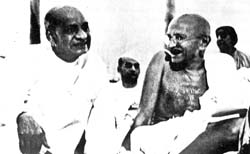

19. In Prison |
In prison Gandhi settled down to a regime of spinning writing, and meditation. The people were disappointed and the Government tightened its hold everywhere. Almost all the leaders were put in jail. Then, in 1924, Gandhi fell ill. He was suffering from appendicitis and was in great pain. The Government was alarmed. What would happen if Gandhi died in prison? An urgent operation was arranged, and Gandhi agreed. The operation was successful, but his recovery was very slow, The Government thought it best to release him, so he was set free. He went to Juhu, near Bombay, for his convalescence. The non-co-operation movement was at low ebb. Many Congress leaders were thinking of participating in the Municipal and Provincial Councils which Gandhi had advised them to boycott. Gandhi was not dismayed or discouraged. He decided to leave politics alone for the time being and spend his time in bringing about Hindu-Muslim unity and the removal of unsociability. So far nearly Gandhi had little to do with politics. But he wrote, he lectured, and he prayed. He travelled all over India. His influence among the people was steadily growing. Gandhi had not given up the idea of non-violent resistance to British rule. He was merely waiting for the right time. Jawaharlal Nehru joined Gandhi in many of his travels. Everywhere they were both greeted with great enthusiasm. Jawaharlal was the hope of the younger generation.  With Vallabhbhai Patel In 1928 the Viceroy invited Gandhi to see him. He informed Gandhi of the appointment of an official British Commission, led by Sir John Simon, which would study Indian conditions and recommend political reforms. 'Will there be any Indians on the commission? asked Gandhi. 'No,' replied the Viceroy. 'That is absurd,' said Gandhi. 'We must boycott it.' Gandhi advised the people to boycott the Simon Commission, and when it arrived in Bombay a hartal was observed all over India. On its tour through the Indians cities the Commission was greeted with black-flag demonstrations. The people shouted, 'Simon, go back!' At many places there were lathi charges and shootings. The same year the peasants of Bardoli, in Gujarat, were agitated by the enhancement of land taxed. Gandhi made a study of their grievances and advised them to resort to satyagraha and the non-payment of taxes. They must be non-violent, he said. Vallabhbhai Patel took the charge of organizing the resistance. The Government tried all its usual measures to terrorize the people, but had to climb down. An enquiry into the grievances was ordered. Vallabhbhai demanded certain concessions. Negotiations were going on when Gandhi arrived in Bardoli. Within a short period the Government came to terms with the organizers and a settlement was reached. Now political tension again gained momentum. People everywhere were preparing for a mass struggle. The Viceroy called a meeting of the Indian leaders. He made the announcement that India would get dominion status, similar to that of Canada. Gandhi wanted an immediate plan for the framing of the Constitution. 'Gentlemen,' the Viceroy said, 'I have no power to promise such things.' Everybody then realized that England was still marking time and was not really willing to part with power. |